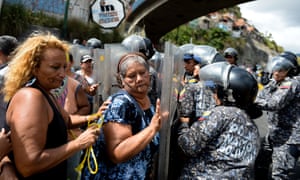
Thursday, December 6, 2018
Venezuela: even The Guardian must admit socialism doesn't work
The Guardian travels across the nation the late Hugo Chávez dreamed of transforming, to understand its collapse

The latrines at Simón Bolívar international airport in Caracas overflow with urine; the taps are bone dry. In the departures hall, weeping passengers prepare for exile, unsure when they will return.
At customs, a sticker on one x-ray machine warns: “Here you don’t speak badly about Chávez!”
But even before stepping outside the terminal it is obvious his Bolivarian revolution, like the airport’s immobile escalators, has ground to a halt.
On 6 December 1998, Hugo Chávez proclaimed a new dawn of social justice and people power. “Venezuela’s resurrection is under way and nothing and nobody can stop it,” the leftwing populist told a sea of euphoric supportersafter his landslide election victory.
Two decades on, those dreams are in tatters.
The comandante is dead and his revolution in intensive care as economic, political and social chaos engulf what was once one of Latin America’s most prosperous societies. Almost 10% of Venezuela’s 31 million-strong population have fled overseas; of those who remain, nearly 90% live in poverty.
To understand Venezuela’s collapse, the Guardian travelled hundreds of miles across the nation Chávez dreamed of transforming, from the spot in downtown Caracas where he gave his first speech as president-elect to his birthplace in the country’s sun-scorched southwestern plains.
On the way, we encountered lingering affection for a charismatic populist still celebrated as a champion of the poor, and a determination among Venezuelans from all walks of life to somehow weather the economic cyclone ravaging their country.
But above all, there was deprivation, hunger, profound apprehension and seething anger – even among proud chavistas – at a government now incapable of fulfilling its citizens’ most basic needs, and in denial over a humanitarian crisis unprecedented in modern Latin American history.
“People do not understand what is happening in Venezuela because it is too hard to believe,” says Alberto Paniz-Mondolfi, a doctor in the city of Barquisimeto, describing the implosion of a health service that was once the envy of the region. “The most oil-rich country absolutely devastated and turned into a war-torn nation – without a war.
“I’m not angry. I’m terribly sad. Because there was absolutely no need to get to this point. They just left the country to die … and it is heartbreaking.”
Twenty years after Chávez declared Venezuela’s rebirth, its capital is on its knees. Billboards try to persuade citizens that “together everything is possible” but the mood is funereal and dazed.
By night, swaths of the city resemble a disaster zone: deserted, carless streets are plunged into darkness by power outages and broken street lights. Famished citizens probe uncollected heaps of rubbish.
“The feeling I have is one of a slow-motion catastrophe,” says Ana Teresa Torres, a Caracas-based author. “It’s as if you are watching a building collapse and there is nothing you can do to stop it.”
Despite the meltdown, in a traditionally chavista shantytown called San Agustín, there is still devotion to the politician many call “mi comandante”.
“He was the man who took the poor out of the catacombs,” says Gilda González, 50, the local coordinator of Misión Ribas, an educational programme Chávez set up in 2003.
González, a self-declared revolucionaria who keeps Fidel Castro’s memoirs by her desk, pointed to an horizon of government-built apartment blocks. “Everything you see here today was the comandante’s doing, and our president, Nicolás Maduro, is fighting hard to continue that work,” she said of the man who inherited Chávez’s revolution after he died in 2013.
Venezuela’s leaders blame the country’s plight on sanctions and an “economic war” waged by what the foreign minister, Jorge Arreaza, recently called the “extremist, supremacist, racist” government of Donald Trump. “It’s not just an economic war, it’s an all-round war – a political war, a media war and a trade war,” Arreaza claimed.
González agrees, and warns Bolivarian militias will resist if the US president makes good on insinuations that Maduro could be toppled by foreign force. “We are ready for asymmetric war,” she says.
But as Venezuela staggers deeper into ruin, once-ardent believers are losing their faith. Pedro García, a chavista social worker and musician in the same community, claims Chávez’s heirs have led the country into an abyss of political infighting and thievery. As if to confirm his point, the following day Chávez’s former treasurer was sentenced to 10 years in jail in the US for taking more than a billion dollars in bribes.
García said he continued to treasure the ideals underpinning Chávez’s Bolivarian struggle – but under Maduro, Venezuela had become like a pressure cooker that had been left on for too long. “This mess will explode any minute.”
When Chávez visited the town of Tinaquillo in 2005 he pledged to revive Venezuela’s flagging textiles industry as part of a state-led effort to reduce dependency on oil – today the source of more than 95% of Venezuela’s export earnings – and hand greater power to workers. “We are forging a new path, a new socialism,” he declared.
Those plans have withered. According to official data handed to the International Monetary Fund (IMF) last month, Venezuela’s economy shrunk 15.7% in 2017, while inflation hit 860%. Experts believe the real situation is far worse.
“See this? This is our country,” says Lilibeth Sandoval, a lawyer and regional representative of the opposition group Vente Venezuela, as she tiptoes through the debris of a derelict textile mill Chávez toured 13 years ago. “Destroyed!”
At a nearby petrol station, attendants complain they have not been paid in months by Pdvsa, the state-run oil company that oversees the world’s biggest crude reserves. “And this is still a good job,” says Eduardo Martínez. Tips from drivers mean it is just about possible to survive.
But Martínez’s trousers are shredded, his shoes filled with holes, and he has a seeping, untreated abscess on his left wrist. “One day this will all come crashing down, just like the Twin Towers,” he says.
A grinning Maduro stares down from a billboard at the turn-off to the rural town of Macapo, alongside the rallying cry: “Vamos Venezuela.”
Thousands of locals have already gone.
The United Nations estimates 3 million have fled the country since 2015 to escape chronic food and medicine shortages, crumbling healthcare and transport systems and an economy in freefall.
For places such as Macapo, which locals say has shed up to 15% of its 100,000 population, the result is broken families and empty homes. “There are no jobs here, there’s nothing,” says Juan Carlos Guevara, a retired teacher.
No life has been untouched and Guevara, 53, is no exception.
In February his wife, Glenda, set off overland for Peru with a group of 15 relatives. She works as a carer-cum-accountant in Lima and sends funds to help her husband who lives off a weekly pension of about 900 bolivares (about $1.8) – an almost impossible task because of rampant hyperinflation that Maduro’s supposedly visionary economic recovery plan has failed to tame.
“That’s not even enough to buy a kilo of cheese,” says Guevara.
With his wife gone, Guevara has busied himself decorating his home ahead of a lonely Christmas. “This year there will be an emptiness,” he says, tears welling in his eyes.
Guevara says he believes political change is on the horizon and Venezuela’s diaspora will soon return to rebuild their homeland. But like all those the Guardian interviewed, he is unable to say how or when.
Venezuela’s opposition is fractured and, while localised protests continue, the mass demonstrations of last year have faded, with many participants chosing instead to leave the country.
“I’m a very optimistic person ... [but] if this doesn’t happen I will leave,” he says. “All of my documents are ready.”
Top chavista officials deny their citizens are going hungry and have called the migration crisis fake news. A visit to the one-room hovel Ivan Henríquez shares with his wife and six children in the city of Barquisimeto gives the lie to those claims. “They are living in a parallel world,” the 35-year-old says of the daily churn of disinformation on state TV.
As Venezuela’s crisis has deepened over the past year, Henríquez, like millions of his fellow citizens, has found it increasingly hard to feed his family, let alone himself. “I used to weigh something like 70kg – now I’m 50kg, or less,” he says, showing the contents of their pantry: a half-empty sack of maize and a plastic bag filled with a few sticks of cassava.
Outside, in a rubbish-strewn garden, his children – aged from 11 months to 13 – study around a table fashioned from a broken door with breezeblocks as legs.
Henríquez says his family survive thanks to a $20 monthly remittance from his brother in Chile. But hyperinflation – which the IMF fears could hit 10,000,000% next year – meant that was becoming increasingly tough.
“So many people are dying of hunger in this country … children are dying because of malnutrition,” he says, lowering his voice to avoid his own offspring overhearing that bleak assessment.
Henríquez blames his family’s plight on an ideological clash from which his country’s leaders have refused to step back. “Venezuelans are stuck in the middle of a war that isn’t theirs.”
The highway to Barinas, the south-western state where Chávez grew up, is dotted with reminders of Venezuela’s decay: families hauling armfuls of firewood or hiking down the hard shoulder because public buses are now as hard to find as food; police barricades where forlorn-looking officers shake down passersby for a pittance; abandoned factories, grain silos and car showrooms being reclaimed by the undergrowth; graffiti demanding the removal of the man most blame for the calamity – “¡Fuera Maduro!” – and patches of scorched asphalt where tires have been burned by protesters.
Fading Socialist party murals insist everything is in order: “Chávez vive y la patria sigue!” (“Chávez lives and the homeland goes on!”)
But these days few are fooled by such claims. “Our lives are becoming impossible,” says Ezequiel Mota, a 73-year-old farmer, queuing outside a military controlled petrol station in the state capital. He expects to be there for at least 10 hours.
Across town the Guardian saw three petrol queues of more than 140 cars each. In the countryside, a driver in an even longer line of vehicles says he has been waiting two days: “Sometimes it’s four.”
“Ninety per cent of citizens are against the government because they are leading us into the most absolute state of misery and poverty in the world,” Mota says. “That’s the truth.”
Rosa Rivas has a poster from Chávez’s final election campaign in pride of place on the wall of her sitting room. “I have so much faith in the president,” she says. “I fear nothing when he’s close by.”
Rivas, at 85 still chavista to the bone, recalls wanting to die when she heard of her protector’s passing. “I love him,” she whispers.
But in the town where Chávez was born, such dedication appears to be fading.
“It’s lucky you came today because last week all the roads were blocked [by protesters],” says Rodolfo Palencia, a farmer and organiser for the opposition group Voluntad Popular.
Palencia, 46, says shortages of food, medicine, gas, petrol and drinking water mean many residents are turning against Chávez’s “malignant legacy”.
A minstrel as well as a militant, Palencia reaches for a Venezuelan four-string guitar to perform his musical rebuke to chavismo. “From here in Barinas, I want to ask my Venezuela for forgiveness,” he sings. “Because we know it was here that the disaster began, it was here that the comandante who destroyed my nation was born.”
Palencia’s mother, Vidalina, grew up with “Huguito” and cheered his rise to power in 1998. “I felt proud that a boy I knew was going to be president of the republic and suddenly everything was going to change,” the 68-year-old says.
But Vidalina’s feelings shifted for good after she was diagnosed with cancer and – like millions of ailing Venezuelans – was unable to find the drugs she needed. “My only desire is for this mistaken revolution to end.”
In 2016 Vladimir Putin donated a granite statue of Chávez to Sabaneta and it was placed in one of its main squares to celebrate the legacy of “the illustrious son of the Venezuelan people”.
Today it is chipped and charred having been set upon by anti-government protesters. They failed to tear it down, but have vowed to return.
Nearby, Chávez’s childhood home is open to the public as a tribute to Venezuela’s “21st-century liberator” and his Bolivarian crusade. But it, too, has fallen on hard times. One room lacks a lightbulb; in another, a display case holding a pair of maracas has fallen off the wall and is propped up on two plastic chairs.
Outside on the veranda, beside a mango tree the comandante once scaled, there is a guestbook containing homages that sometimes hint at Venezuela’s decline. “Very good,” one pilgrim wrote in April. “But lacking in electricity.”
The museum caretaker, charged with receiving tourists since its two unpaid guides quit earlier this year, invites his latest visitors to add their names to the revolutionary register.
There was just one problem. “We don’t have a pencil right now.”
Additional reporting Patricia Torres and Clavel Rangel
• This article was amended on 6 December 2018 to replace the word “exasperated” in the heading on a graph, where “exacerbated” was meant.
Subscribe to:
Post Comments (Atom)
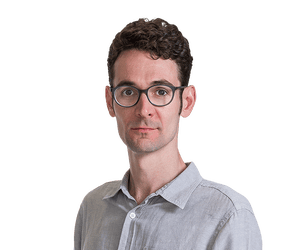
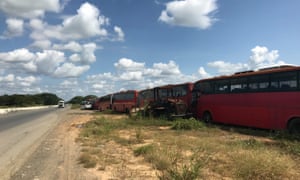
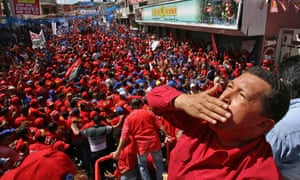

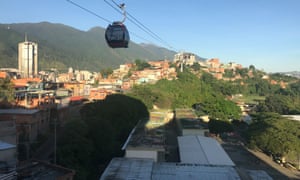
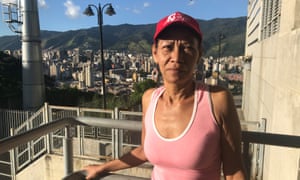


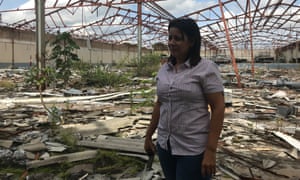
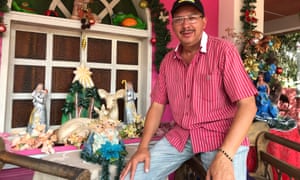

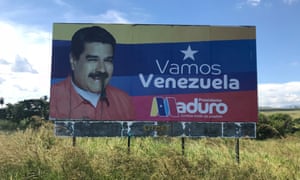

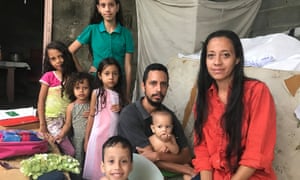
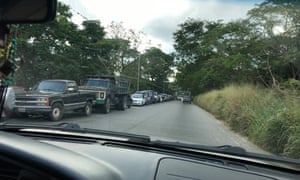
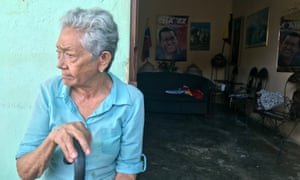

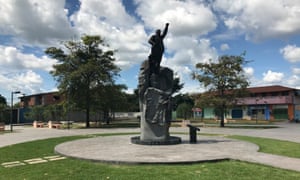



No comments:
Post a Comment